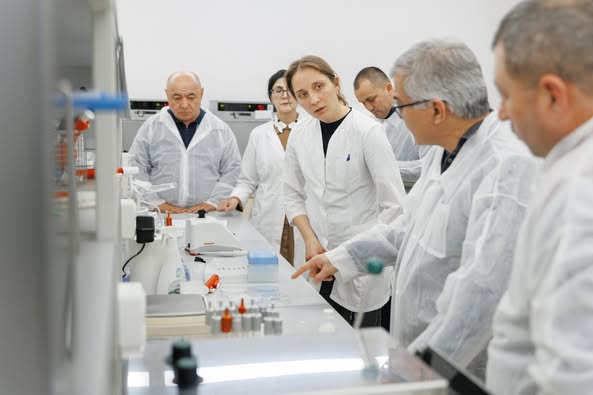In the framework of the implementation of the project “Open food innovation University ” (OFINU) of the Erasmus + program of the European Union, a study tour of the working group of developers of educational materials of the Technological University of Tajikistan (TUT), from 8 to 17 January 2025 took place in Latvia.
In this study tour, three teachers from the engineering and technological faculty of the university were included and took part: Ikromi Kh.I., Mirzozoda G.Kh. and Nazarov Sh.A.
The purpose of this visit is to participate in a week-long training workshop at the Latvian University of Life Sciences and Technologies (Jelgava) for the staff teaching of the curriculum developers from participating Central Asian Institutions to present a practical model of the Open University format and conduct a master-class as the scope of pilot modules being implemented in universities.
According to the plan of the training seminar, with the involvement of an experienced specialist in the field of pedagogy of education Iluta Krumina, a lecture was held on the topic “Innovative teaching methods”, in which project partners from the Republic of Uzbekistan and the Republic of Tajikistan also took part in a virtual format, which was useful for everyone and provided valuable experience to the project participants. on the use of interactive teaching methods such as presentations, case technologies, problem lectures, didactic games, brainstorming, interactive exercises using audio and video. materials, round tables (discussions), professional games, teamwork methods or Theoretical and practical classes were held in separate groups, project methods, organizing theatrical scenes, role-playing games, holding round tables, etc. to develop courage in students, overcome psychological barriers and fears, be able to defend their ideas and prove their own opinion.
The effectiveness of using such active teaching methods is also confirmed by the fact that they develop in students a sense of responsibility, mutual assistance, tolerance, and contribute to the formation of communicative and professional competence of teachers.
During the study workshop, innovative teaching methods using professional games were discussed, such as the method of working in teams or in separate groups, the project method, role-playing games, holding a round table, which will help to use this modern experience at the university to increase students’ motivation for learning. Specialized subjects and pedagogical skills of teachers contribute to this.
The exchange of views between scientists and food industry specialists from the project partner countries was aimed at finding ways to improve the quality of education using innovative teaching methods and identifying prospects for the development of higher education.
It should be noted that industry experts from the Latvian University of Life Sciences and Technologies (Jelgava), in cooperation with each of the developers of educational materials for the project modules from the partner universities, assisted in the development and implementation of the concept and content of the methodological manuals for conducting theoretical classes and experimental work they did it.
It should be noted that in accordance with the set of workshop tasks, the teachers of the university entered to another part, the pilot implementation of the project modules, which worked out by the teachers of Technological University of Tajikistan, such as “New food production development”, “Technology of milk and dairy products”, “Academic Writing. Participants used conducting of practical and experimental works, methodological instructions and digital processing of reacting ofsults in automated programs.
In the frame of using the new technology of producing products based on enriching the composition of food materials with protein and vitamin substitutes, several new types of food products were prepared, such as the production of a “meat” cutlet without using meat, as well as the production of ice cream for pets (dogs) in a training laboratory. This turned out to be very interesting and eye-catching. It should be noted that the produced “meat” cutlet is a completely dietary product, useful for people with diabetes and for preventing obesity.
According to the planned program, the participants of the training workshop took part in sensory evaluation of various finished food products, the use of modern technological methods and packaging equipment, as well as in a theoretical lesson on the HACCP system.
After discussing the modules, the participants conducted a SWOT analysis of the strengths, weaknesses, opportunities and threats of the project, and the assessment was made by the academic expert of the project, Dace Klava.
In the framework of the cooperation between science and production, university representatives visited the enterprises of JSC Dobeles Dzirnavnieks (grain products) and the Tukum dairy plant, which produces more than 400 types of dairy products.
In the end of the event, the main coordinator of the OFINU project, Irina Kulitane, gave recommendations on the implementation of the project implementation plan in partner institutions and the holding of seminars and trainings with teachers and project stakeholders from industrial enterprises within the framework of the knowledge and skills program obtained during the training seminar.

